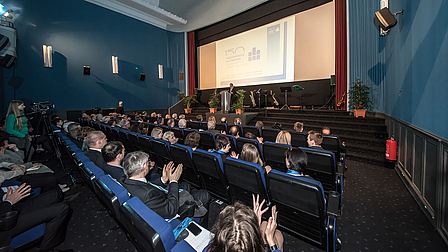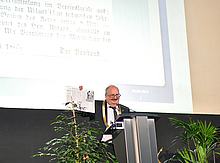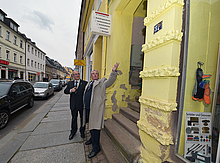It all began with a “Straßenhochschule”
For the anniversary kick-off everybody returned to where it all began 150 years ago: Mittweida’s theatre (today’s movie theatre "Kino Filmbühne") where the first lectures of the "Technicum Mittweida" took place in the late 1870s. In his welcome speech, headmaster Ludwig Hilmer reminded the more than 100 guests of all the roots.
On 3 May 1865, 25-year-old Württemberg-born Wilhelm Heinrich Uhland, founded the "Uhland Technicum", a private higher educational institution which was to provide training for mechanical engineers. Even though Uhland already put considerable emphasis on relating theory and practice, he struggled create an economically sound foundation. Carl Georg Weitzel, one of the teachers employed by Uhland, consequently took over the ambitious project and on 7 May 1867 opened "Technicum Mittweida" with the support of local entrepreneurs.
At first, "Uhland Technicum" settled in different buildings, mainly "Rochlitzer Straße" and in the theatre (today's cinema), with offices, boarding school and class rooms. That infrastructure was kept on and expanded upon when Carl Georg Weitzel took over in 1867. It wasn’t until the 1890s that the "Technikum" buildings of today’s campus were built at the "Galgenberg", which was then located outside town limits.
Then, as now: successfully combining theory and practice
The institution, which was operated by Weitzel and his successor Alfred Udo Holzt as a private educational institution, soon attracted many students: By the turn of the century it had become one of Germany’s biggest private schools training both mechanical and electrical engineers.
Building on this early success, the two "Uhland lectures" were held to focus outside views on the history of the university.
Robert Salzl, former chief pilot and head of "Lufthansa AG"'s airline operations in Germany, referenced Mittweida's typical connection of theory and practice when he pointed out its necessity using the example of mankind's ancient dream of flying. Some aircraft engineers also originated in Mittweida: Bruno Buschmann (1893-1913), Rolf Heinkel (1915-1951), Gerhard Neumann (1917-1997), Karl Schwärzer (1901-1974) and Oskar Ursinius (1878-1952) among others.
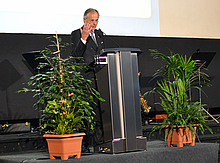
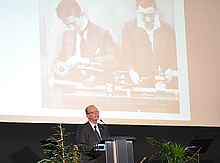
The second "Uhland lecture" was dedicated to August Arnold (1898-1983). He studied in Mittweida from 1916 to 1918 and immediately afterwards, together with Robert Richter, founded a company that has become world-renowned: ARRI – a name composed of the first 2 letters of the young founders' last names. Michael Koppetz, senior engineer for research and development at the ARRI group, demonstrated the company’s development from producing the first "Arriflex" in 1935 to its latest movie cameras, such as the "Alexa", that most of today's movies are shot with.
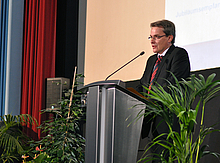
Mittweida's Councillor and deputy Lord Mayor Ralf Schreiber highlighted the university's significance for the "college town” of Mittweida - a label the town has recently officially applied for. With that, Mittweida aims to attract more people to study and live there hoping to further increase its popularity and convincing more students to become local residents. Based on contemporary police reports Schreiber could prove that there was a time when students had a stronger influence on the town life.
The ceremonial conference on Sunday, the 150th anniversary of the foundation day, was attended by the university's senate, its management, its council, the deans of the faculties, further professors and employees as well as student representatives, the anniversary’s organizational committee, the city council and key figures from politics and industry. Afterwards, a reception was held at Mittweids’s town hall.
